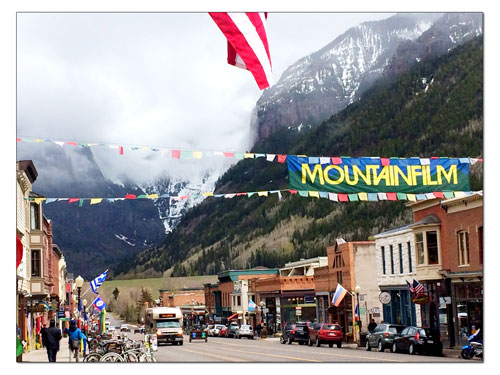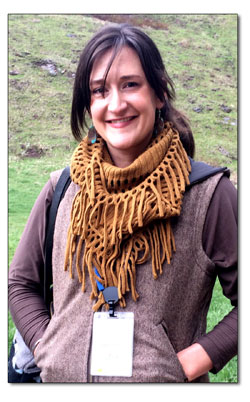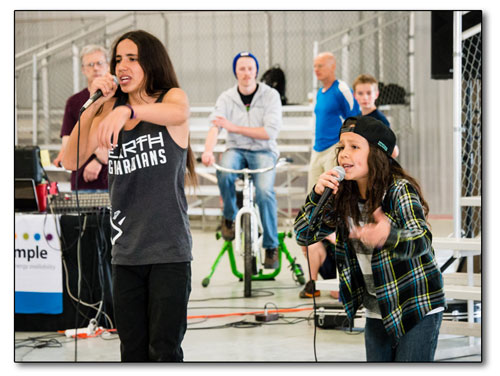
A banner hangs over Telluride’s Colorado Avenue announcing the 37th annual Mountainfilm Festival. This year’s event, which took place over Memorial Weekend, featured 74 films as well as the Moving Mountains Symposium, parties, intimate talks, book signings, special events, musical performances and more./Photo by Jaime Becktel
Meeting of the minds
Mountainfilm brings exploration of world, ideas to our back yard
by Jaime Becktel
If you missed the 37th annual Telluride Mountainfilm Festival over Memorial Weekend, fear not… you can go next year. And with evangelical fervor, I heartily recommend you to do so. To put it simply, Mountainfilm is extraordinary. It draws a staggering volume of award-winning filmmakers, documentarians, authors, researchers, journalists, photographers, artists, activists, conservationists, adventurers and game changers to the nestled hamlet of Telluride each spring.
Its mission: To educate, inspire and motivate audiences about issues that matter, cultures worth exploring, environments worth preserving, adventures worth pursuing and conversations worth sustaining. This year’s festival showcased 74 films ranging in length from two minutes to two hours, spanning a colorful spectrum of subjects both awe inspiring and heartbreaking.
 The writer, fully credentialed./Courtesy photo |
In “Frame by Frame,” an exceptional film by Alexandria Bombach and Mo Scarpelli, I’m humbled by the courage of four Afghan photojournalists preserving the stories of their people through photography, despite the ever-present threat of war. As the credits rolled, two of the four award-winning photographers, Massoud Hossaini and Farzana Wahidy, entered the room to a barrage of applause.
Mountainfilm is special in that way – characters you’ve fallen in love with just moments before magically materialize from a two-dimensional screen image into a living, breathing being.
On a street corner, I met Louie Psihoyos, National Geographic photographer and filmmaker known for his 2009 Academy Award-winning documentary, “The Cove.” His new film, “Racing Extinction,” employs his signature guerrilla investigative style, exploring the critical juncture humanity faces with the rapid disappearance of species and climatic pressures surging us toward a sixth potential extinction crisis. Like many of the films I saw over the course of the weekend, “Racing Extinction” is a slap in the face; a reality check; a hard pill to swallow. But it’s not without hope. Each film ignited within me a sense of urgency, a focusing and a clear appreciation for the issues as real and worthy of my attention. I left each theater feeling the gravity of a film’s subject but resolved to light candles rather than curse the darkness.
In “How to Change the World,” writer/director Jerry Rothwell pieces together interviews and archival footage recounting the visionary yet turbulent rise of Greenpeace. In the early 1970s, a motley gang of eco-freaks from Vancouver took on nuclear testing, whale hunting and seal-pup slaughter, forging a fledgling environmental movement that spans the globe to this day. Perfectly illustrating Margaret Meade’s famous quote, “Never doubt that a small group of thoughtful, committed citizens can change the world” – as well as the power struggles and organizational challenges experienced by evolving social movements – “How to Change the World” is an authentic mirror reflecting the greatness we as individuals are capable of, as well as the inherent vulnerability of our human failings.
The unapologetic grit of Matthew Heineman’s “Cartel Land” is like a swift kick to the jaw that leaves me uneasy and speechless. Deeply immersed in the raging cartel border wars and within the ravaged Mexican state of Michoacán, Heineman gives us access to a lawless world of corruption, violence and chaos. “Cartel Land” is not a tale of sustained triumph, but rather, it documents a raw and psychotic social unraveling. From this unfiltered truth we bear witness to the stories and lives of the people involved, broadening our capacity to care and creating potential avenues for change. Through such heavy-hitting imagery, victims of violence and oppression are seen, heard, and their suffering does not go unacknowledged.
For each of the films I saw, there are dozens missed. For each of the directors I met, the Q&A’s I sat in on, and the coffee talk sessions I rose early each morning to attend, there are countless other documentarians, photojournalists, conservationists and geniuses I would have loved to learn from. I’m not much for celebrities or the worship of pop cultural icons, but I go weak in the knees for the Steve McCurrys, the Galen Rowells and the Michael Fays of the world. I morph into a giddy, idealistic third-grader over the Jane Goodalls and Julia Butterfly Hills of our society, which is why Mountainfilm is my ultimate geek out. That caliber of person was everywhere I looked at this festival, passing me on the street, sitting next to me at the coffee shop. Like a Stan Lee-obsessed teen-ager at Comic-Con, I salivate over the adventures of each Nat Geo photographer, tears well for every heart-bleeding cause and my chest swells with deep gasps of inspiration in the presence of so many activist souls. My friend, a longtime attendee, was right – Mountainfilm changed me. I’m more aware, more attentive, more informed, more politicized, more awake and more alive than ever.
 Boulder hip-hop eco-activists Xiehtezcatl Tonatiuh Martinez, 14, and his younger brother, Itzquauhtli, 12, (seen here in a prior performance) were also on hand at Mountainfilm to spread their message./ Courtesy photo |
Memorial Day Monday, the final day of the festival, I received a massive download of hope and proactive energy from two young warriors, 14-year-old Xiehtezcatl Tonatiuh Martinez and his 12-year-old brother, Itzquauhtli. Eco hip-hop artists, activists, public speakers and indigenous change agents, the brothers are associated with the nonprofit organization Earth Guardians, out of Boulder. Meeting them was the indisputable highlight of my Mountainfilm experience. With a tribe of young activists, artists and musicians from around the globe, they are rising up as international leaders and empowering youth to co-create a bright future of possibility. I’m awestruck by their passion and articulate intelligence. In 2013, Xiuhtezcatl received the United States Community Service Award from President Obama and was the youngest of 24 national change makers chosen to serve on the President’s Youth Council. In 2014, Itzquauhtli embarked on a 45-day silent strike for climate action and collected more than 1 million signatures from youth around the world to deliver to United Nations leaders in Paris this December. I can’t help but ponder what I was doing at their ages … certainly not suing the Colorado Oil and Gas Conservation Commission (COGCC) for failing to protect Colorado’s public health and the environment from oil and gas development.
During their hip-hop performance Memorial Day morning, I sat front row center and soaked in the brilliance of youth empowered. Their lyrics ignite the room: I’m young, and I’m positive/ I’m the future, gonna tell it like it is/ I won’t let anything stand in my way/ Got my eyes on the prize, gonna stay that way.
Says Xiuhtezcatl, “Mountainfilm brings important stories that are often unheard, and voices that are often silenced are able to be expressed here ... It’s an incredible thing for people to come together around film because the imagery is so powerful and provoking. Films get people on their feet, in action and talking about important issues.”
To learn more about the Telluride Mountainfilm Festival and to begin planning a full weekend immersion for the spring of 2016, visit www.mountainfilm.org. Consider joining the ranks of volunteers who make this international meeting of the minds possible and don’t miss the Mountainfilm world tour, a selection of current and best-loved films from this year’s Telluride festival, coming to the Durango on Nov. 7.
In this week's issue...
- December 18, 2025
- Let it snow
Although ski areas across the West have taken a hit, there’s still hope
- December 18, 2025
- Look, but don't take
Lessons in pottery theft – and remorse – from SW Colorado
- December 11, 2025
- Big plans
Whole Foods, 270 apartments could be coming to Durango Mall parcel
